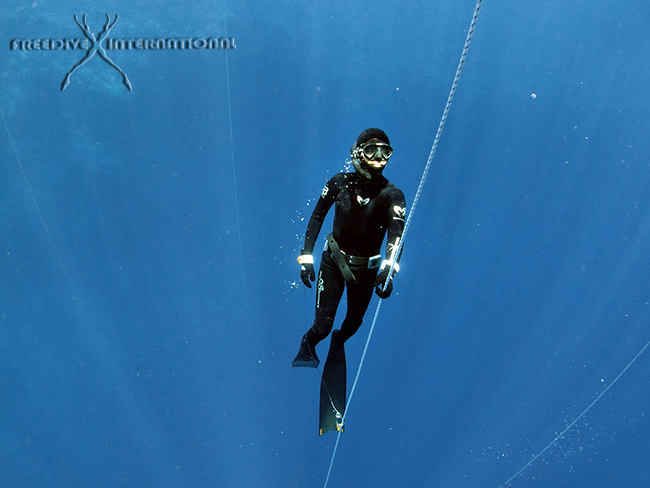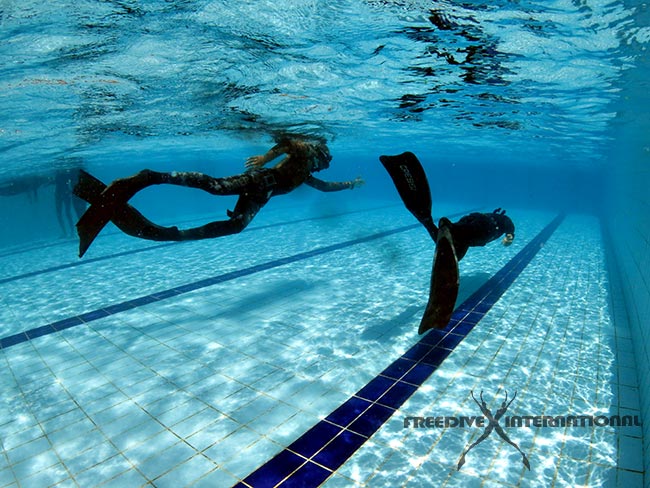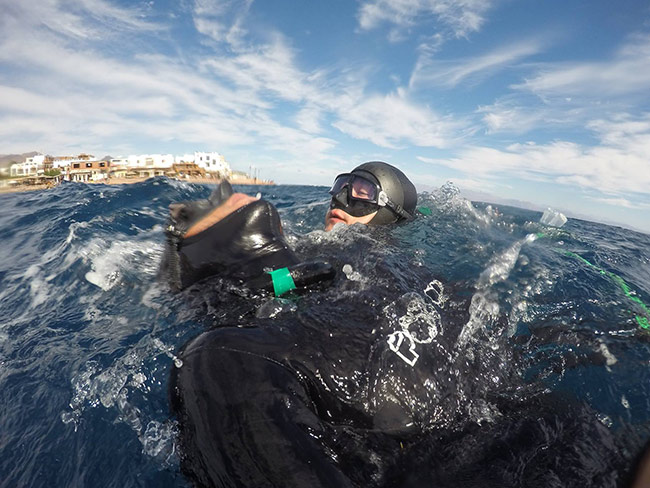Learn to freedive – Where to start?
Many times we get requests for tips from people who want to start freediving but don’t want to do a freediving course, either because there is no instructor available in their area, or because they simply want to save money or spend it on equipment instead.
All over the internet you can find tips for beginners, and online freediving courses for complete beginners popped up recently. Even WikiHow has a page for this (and most of its content is full of wrong and unsafe information).
At Freedive International we always tell them that we don’t teach online, not for free, and not for a fee. Why? Because not only it is ineffective, but especially because it is dangerous.
It is ineffective because there is no way to check that the “student” understood the instruction given and he will perform the skill correctly when he go practicing.
In fact it is impossible that a student will ever understand practical instruction without a demonstration and without feedback and corrections from the instructor.
What is even worse is that teaching online is encouraging a very dangerous behavior, in fact the student will need to go practice in the water alone without the supervision of an instructor, i.e. without safety. “Don’t ever freedive alone” is the first rule of freediving, remember??
You want to start freediving?
And you should! Freediving is possibly one of the coolest things you will do in your life!
Your first investment should not be the equipment but proper instruction: in fact any serious freediving school out there will have suitable gear for the students. If they don’t, most likely it means they are not committed and they don’t teach regularly.
Proper freediving instruction is more important that equipment because:
-A good freediving instructor will give you a good solid basis for your future career as a freediver, no matter if you aim at becoming a competitive freediver, or if you are planning on using your feediving skills for recreational purposes, or spearfishing, or underwater photography and so on.
-A good freediving instructor will teach you SAFE freediving. This means many different things: the first thing to understand is what is conservative behavior vs reckless behavior. a lot of inexperienced and self taught freedivers do very reckless things, simply because they are not aware that they are dangerous. So the first thing is to learn what is good and what is bad. The second thing is to learn how to progress in a way that is safe, without taking unnecessary risks. Then comes the learning how to rescue freedivers who suffered a Black Out or LMC. Knowing that your buddy too has be trained properly means that if something does happen to you, he will know how to rescue you. This will save your life.
In the last years, freediving became very popular and presently you can find many freediving schools, especially in warm touristic locations. If you cannot invest in a freediving trip, you can combine your family holiday with a freediving course. Your partners and children can laze on the beach while you take 2 days for your freediving course. Yes, most beginner courses are done in 2 days, and the price average is 150/300 euro depending on the location.
What you will learn during a beginner freediving course?
Practical dry sessions
One of the most important part of a beginner course is to learn how to breathe properly; this is divided in 3 phases: 1- how to breathe properly in preparation for a breath-hold; 2- how to take a final breath before a breath-hold; 3- how to breathe properly after a breath-hold (recovery breathing). Note! most of the info you find on the internet will tell you that you breathe-up for storing extra oxygen and to rid your body of carbon dioxide. This is not only wrong but it is dangerous as it encourages hyperventilation. Breathing up has nothing to do with storing extra oxygen (which is physiologically impossible btw). To have a better insight check our blog article about Breathing for Freediving.
Some freediving schools also teach some simple stretching for freediving to their beginner students.
Practical water sessions
Most beginner courses will have 1 or more pool sessions and should have at least 2 open water sessions.
In the pool (or confined water) the main work is done over static apnea (laying on the surface holding your breath, to extend your comfort with just holding your breath) and dynamic apnea (swim horizontally underwater, to work on your finning and body position without the extra challenge added by diving vertically down and all that this entails).
Once you are comfortable with holding your breath and have a good idea of how to streamline and swim properly with long fins, it is time to introduce the real thing, depth. You will start slowly by doing some dives usng the rope to pull yourself down and practice your equalization. when this feels comfortable you will practice duck diving and learn how to propel yourself underwater without pulling yourself at the rope, in the discipline called Constant Weight. Slowly and after many repetitions you will learn how to dive this way comfortably to 5 meters, then 10, and probably deeper. Most beginner students will achieve 12/15 meters on their second session.
Some reach 20 meters without any problems.
You will also learn how to provide proper safety and to rescue a buddy who suffered black out or LMC. This way, you will become an independent freediver and will be able to practice with your buddy, or at your local freediving club, and not having to rely on being with an instructor whenever you want to train.
Theory sessions
And this is the part that most students think is boring and for some it is actually a reason for not wanting to sign up to a course! This is a nonsense, of course, as not only you NEED to know what is going on in your own body as you hold your breath and dove to depth, but the best part is that IT IS EXTREMELY FASCINATING to realize what your body is capable of without you having to do much at all other than relaxing a bit and learn a couple of technique tricks!
Of course your instructor plays a big role in how interesting or how boring you will find the theory classes; a good instructor will be able to catch your attention and you will ask for more!
Still asking yourself if you should do a freediving course or learn on your own?
As someone who is self taught (because courses didn’t really exist when i started), i can tell you that i would have happily skipped all those months of trial and error, and a lot of frustration (due to my poor understanding of equalization) and i would have chosen to pay a good instructor to teach me the basics. I would have been able to achieve in 1 week what it took me several months to learn!
When you decide it is time to book your first course, make sure that the school you choose will cover all there these points in their courses.
Do you want to start freediving in one of the best places in the world AND get a discount? Don’t miss this promotion!
With this promotion you get a 20% discount on the Beginner Freediving Course at Freedive Dahab, on any of the beginner courses that are already scheduled between August 2016 and August 2017)!
This promotion is valid until the end of August 2016, so you have plenty of time to think about it before signing up. If you want to sign up copy and paste the text below and add it to your booking email to [email protected]
PROMO 20% DISCOUNT- BEGINNER COURSE – FREEDIVE DAHAB

Text and photos by Linda Paganelli. Linda has been freediving since 2002, participated to several competitions and record attempts and broke 16 Italian records and 1 continental record.










